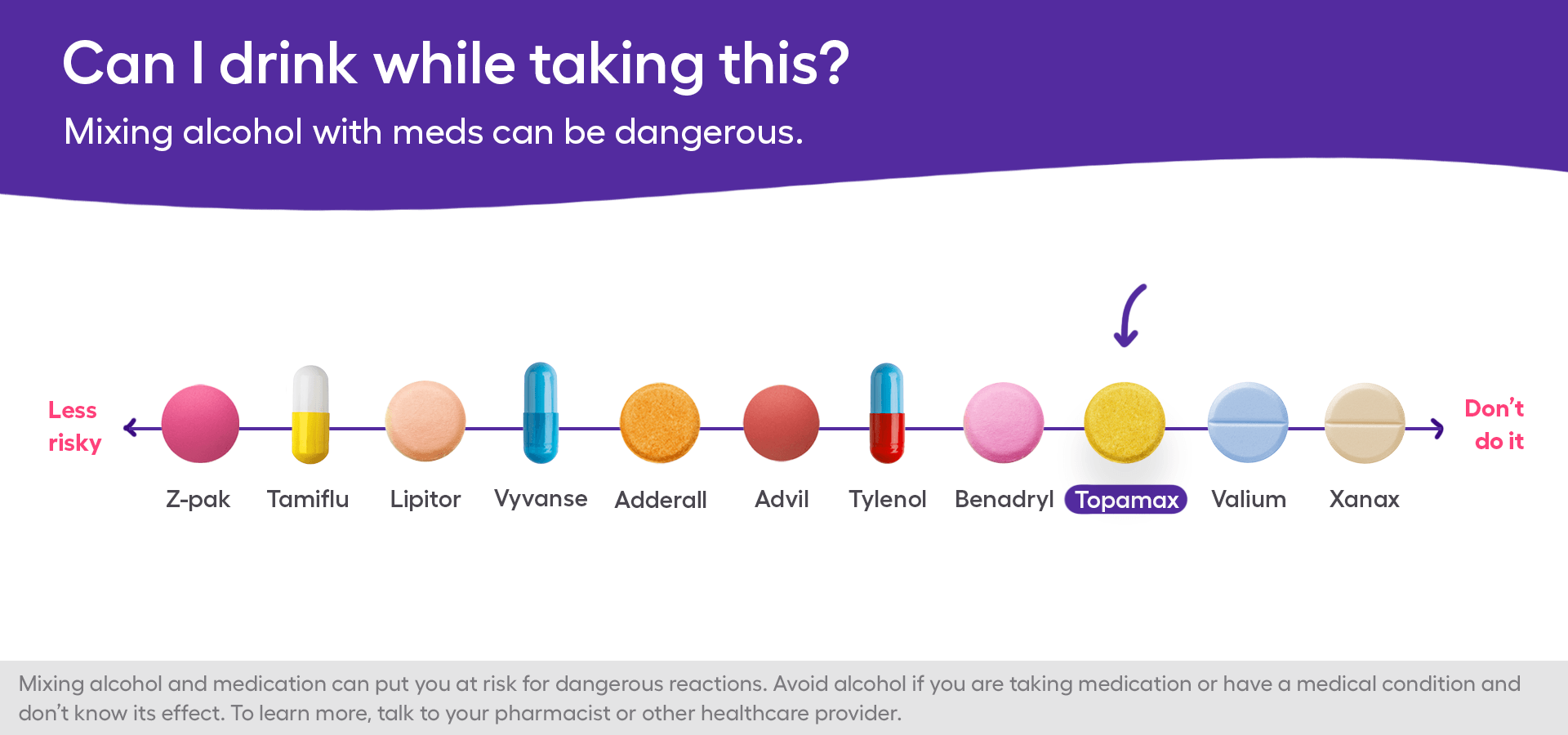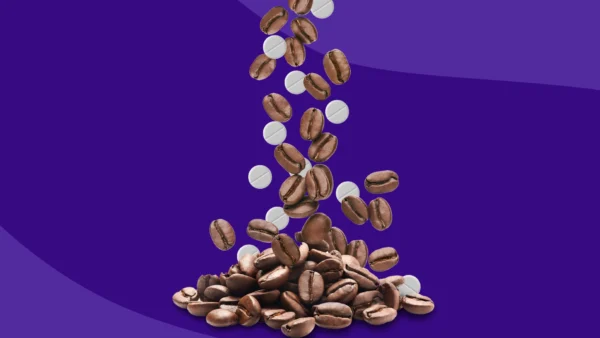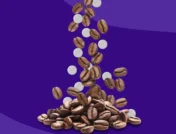If you experience migraine, you’re not alone. Migraine is the third most prevalent illness worldwide—almost one in four households include someone with migraine. Migraine can be incapacitating, causing missed work and school days. In addition to throbbing pain, migraine is often accompanied by many other uncomfortable symptoms, such as visual disturbances, nausea, vomiting, and dizziness.
With June being Migraine and Headache Awareness Month, we want to shine a light on things that can affect people with migraines. One such complication is drinking with your migraine medication, such as Topamax.
What is Topamax?
Topamax (topiramate) is a popularly prescribed drug used to treat certain types of seizures in people ages two years and older. The medication is also used to prevent migraine in people ages 12 years and older. Topamax is not used to treat a migraine attack. It is only used for prevention.
Topamax, like any other medication, has many potential side effects. Some common side effects of Topamax include weakness, dizziness, drowsiness, appetite/weight loss, mood changes (anxiety, depression, suicidal thoughts and behavior), memory and sleep problems, and a feeling of pins and needles.
One common question among people who take Topamax is: Can I mix Topamax and alcohol?
Can you take Topamax with alcohol?
Unfortunately, Topamax and alcohol do not mix. The manufacturing information for Topamax warns, “Do not drink alcohol while taking Topamax. Topamax and alcohol can affect each other, causing side effects such as sleepiness and dizziness.”
As for other forms of Topamax, it’s also a no.
Trokendi XR is an extended-release form of topiramate, the same ingredient in Topamax. Trokendi XR is indicated to treat certain types of seizures in people ages 6 years and older. It is also used to prevent migraine in patients ages 12 years and older. Alcohol is contraindicated (must not be used) within six hours of taking Trokendi XR. The manufacturer of Trokendi XR states that the way the drug works is “significantly altered” when in the presence of alcohol. This could result in significantly higher levels soon after taking Trokendi XR and too-low levels later on.
Qudexy XR is another extended-release form of topiramate. The manufacturer warns, “Do not drink alcohol while taking Qudexy XR. Qudexy XR and alcohol can cause serious side effects such as severe sleepiness and dizziness and an increase in seizures.”

Topamax and alcohol use disorder
Although Topamax is often used to treat seizures or prevent migraines, it has some off-label uses, too. Although there is not much data, some studies show that Topamax can help decrease alcohol consumption. A review by the Agency for Healthcare Research and Quality (AHRQ) concluded that topiramate could reduce the number of drinking days, heavy drinking days, and drinks per day based on two trials.
Can you drink alcohol while taking anticonvulsants?
According to the National Institute on Alcohol Abuse and Alcoholism, alcohol should not be mixed with any anticonvulsant due to increased drowsiness and dizziness. In addition to Topamax, these medications include:
- Dilantin (phenytoin)
- Keppra (levetiracetam)
- Klonopin (clonazepam)
- Lamictal (lamotrigine)
- Lyrica (pregabalin)
- Neurontin (gabapentin)
- Phenobarbital
- Tegretol (carbamazepine)
- Trileptal (oxcarbazepine)
Does alcohol make seizures worse?
Keep in mind that everyone is different. Talk with your doctor to determine if you can drink alcohol at all, and if so, how much you can safely drink depending on your symptoms, medical history, and any medications you take.
Small amounts of alcohol, such as an occasional one or two drinks, generally do not increase seizure activity or affect seizure medications in your body. Seizures related to alcohol are often associated with alcohol withdrawal rather than the act of drinking; however, consuming three or more alcoholic beverages may significantly increase the risk of seizure. Binge drinking and resulting alcohol withdrawal may lead to status epilepticus, which could potentially be fatal.
Chronic alcohol abuse (alcoholism) may be linked to the development of epilepsy in some instances. People who have had seizures after binge drinking may begin to have seizures even when not consuming alcohol.
If your doctor says you may consume alcohol in small amounts or moderation, you should:
- Avoid binge drinking because binge drinking can cause withdrawal seizures.
- Not abuse alcohol—get help if you need it.
- Drink small amounts—less than three drinks—and drink slowly.
- Talk to your doctor about alcohol consumption as related to seizures and medication.
- Not drive (this goes for alcohol consumption in general, of course) due to impaired coordination and increased sedation and dizziness.
Does alcohol make migraines worse?
According to the American Migraine Foundation, alcohol may trigger a migraine attack. Alcohol can trigger an attack within several hours. It can also cause a hangover headache. If you find that a small amount of alcohol does not trigger a migraine attack or a hangover headache, consult your doctor about appropriate amounts to consume. However, keep in mind that the medication(s) you take to prevent and treat migraines may interact with alcohol. Your doctor can examine your medical history and conditions as well as any medications you take, to determine how much alcohol, if any, is safe for you to consume.
Is Topamax hard on the liver?
People with liver problems may not eliminate topiramate properly, leading to increased topiramate levels, potentially increasing side effects. The manufacturer suggests using topiramate with caution in people with impaired liver function.
In rare cases, people with liver problems who take Topamax, especially when also taking valproic acid, may be at higher risk for hyperammonemia (a dangerous condition caused by high levels of ammonia) with or without encephalopathy (brain disease or damage). Symptoms may include unexplained tiredness, vomiting, or mental status changes and should receive immediate medical attention.
Suicidal thoughts and behavior
It is important to recognize that anticonvulsant drugs, including Topamax, increase the risk of suicidal thoughts and behavior, regardless of the indication for which the person is taking the medication. When taking an anticonvulsant, the patient must be monitored closely for mood or behavior changes, depression, and suicidal thoughts and behavior.
A study looked at data about alcohol use and suicide. It found that “alcohol abuse is a means of easing one’s psychological stress but, at the same time, impacts on all other factors, rendering suicide more likely.”
Since both alcohol and Topamax can potentially cause suicidal thoughts or behavior individually, the impact together could be greater.
Consult your doctor
Medications and alcohol affect everyone differently. Talk to your healthcare provider if you have questions about Topamax and alcohol interactions or about alcohol in combination with your medical conditions.











